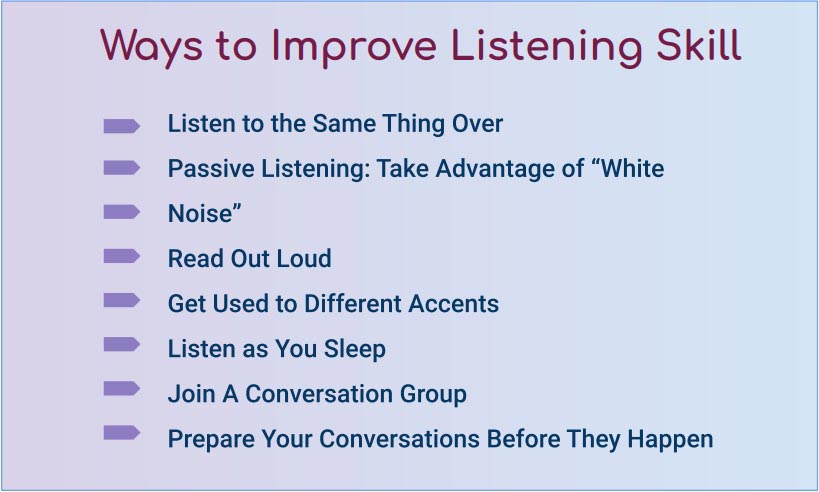All about Listening as a Communicative Skill
Listening is undoubtedly a skill that you must need for being able to communicate in a language. But don’t we take listening for granted? We don’t really put much emphasis on this skill as we think that it comes naturally and there is not much to learn for improving our listening skill. Listening is the “least understood” and “most overlooked” skill for the natives; however, should it be the same for the second or foreign language learners?
What is Listening?
Listening is definitely more than an ‘automatic passive’ skill. Listening is not just hearing. You might be wondering whether there is any difference between listening and hearing or not. Yes, there is a clear distinction between hearing and listening.
- Hearing refers to the act of receiving what the speaker actually says.
- Listening is decoding the speaker’s message and getting the idea.
Listening as a Skill:
- Listening is a constructive skill. Listening involves a process of constructing and representing the meaning of the sounds that we hear from someone. Using this constructive skill, we identify the important message and the intention of the speaker.
- Listening is a collaborative Listening involves a process of negotiating meaning with the speaker and responding according to it. It also involves response, clarification, negotiation, and retention. Listening is also a reciprocal action. For example, if a listener is unable or unwilling to listen to the speaker, listening won’t be successful by any means.
- Listening is a transformative skill. Listening involves a process of creating meaning through involvement, imagination and empathy. It also involves a process of connection, reception, and change in cognition.
Types of Listening
It might be appalling to you that even listening can be divided into types but actually it can. There are mainly two types of listening:
- One-way listening:
One-way listening is also known as transactional listening. Generally, it occurs in the information-oriented events. The function of this type of listening is to transfer information. For example: Listening to monologues, formal speech, commentary, etc.
- Two-way listening:
Two-way listening is also known as interactional listening. Generally, it occurs in the listener-oriented events. The function of this type of listening is to maintain (social) relations. For example, listening to natural sounding dialogues.
How Listening Occurs?
There are mainly four types of processing that integrate and complement each other when listening occurs.
- Neurological Processing: It answers the question how listening is organized in all human beings. The neurological processing also explains the individualized nature of the listening experience.
- Linguistic Processing: It answers the question how listeners identify units of spoken language. The linguistic processing also explains how listeners recognize words.
- Semantic Processing: It answers the question how listeners construct meanings. The semantic processing also explains how memory and prior experience affect our understanding.
- Pragmatic Processing: It answers the question how listeners identify relevant factors. The pragmatic processing also explains How listeners interject their own intentions.
Listening Strategies:
Successful listening relies on the strategies a listener uses when listening. Buck (2001) identified two kinds of strategies in listening:
- Cognitive Strategies:
Cognitive Strategies are the mental activities related to comprehending and storing input in working memory or long-term memory for later retrieval
|
Comprehension processes >>> Storing and memory processes >>> Using and retrieval processes |
- Metacognitive strategies
Metacognitive strategies are those conscious or unconscious mental activities that perform an executive function in the management of cognitive strategies
|
Assessing the situation >>> Monitoring >>> Self-evaluating >>> Self-testing |
So, you might have already guessed that listening is complex process of communication. However, don’t worry; it’s not that difficult as a skill to master if you are determined enough. We will get back to you with more tips and techniques to improve your listening skill.
Grammar
Read More
- How to Use "Therefore" in Sentences Avoiding Common Mistakes
- How to Use "Whereas" with Examples and Avoid Common Mistakes
- When and How to Use "Thus" Correctly Without Common Mistakes
- How to Use "On the Contrary" Properly with Meaning and Examples
- When and How to Use "Either/Or" with Examples and Common Mistakes to Avoid
- How to Use "On the Other Hand" Effectively without Mistakes
- How to Use "Respectively" with Example and Common Errors to Avoid
- How and When to Use "Moreover" Without Mistakes
- How to Use "Likewise" in Sentences Based on Context & When not to Use
- When & How to Use "Although" in Sentences to Avoid Mistake

